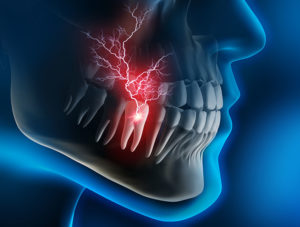
Dental pain can be a dull, aching discomfort, or sometimes acute dental pain starts fast and won’t go away. A sudden toothache can be quite painful, and you must act fast to reduce the pain and talk to your dentist as soon as possible.
Symptoms of a Toothache
A variety of symptoms can accompany a toothache. If you are in pain, then you might be experiencing one or more of these symptoms:
- Sudden, sharp pain that feels like your tooth or gums is being stabbed with a sharp object
- Throbbing around the tooth, like you can feel your heartbeat moving through the area
- Irritated, red gums
- Discharge in the irritated area of the gums
- Generalized pain
- Fever and chills if an infection is present
In most cases, a toothache or dental pain is an indication of a specific issue that needs to be addressed. For example, you might have a gum infection or tooth decay that is causing the pain symptoms. It is important to seek dental attention as soon as possible to address the underlying problem.
Immediate Pain Relief Options
If you can’t have your tooth examined right away, then it can be helpful to use at-home remedies to reduce the pain:
- Flossing: Sometimes, it is as simple as flossing your teeth to remove food that is lodged in the gumline. Something as small as a piece of popcorn kernel can cause irritation that results in dental pain.
- Salt Water Rinse: Clean the area with a saltwater rinse. Add a tablespoon of salt in a glass of warm water. Stir the mixture so the salt dissolves. Then, swish the mixture in your mouth and repeat as necessary. The saltwater solution can be beneficial to draw out fluids that are in the gums due to infection.
- Cold Compress: Consider using a cold compress on the outside of your mouth. The cold temperature helps to reduce inflammation and calm the nerves, so the pain is less severe.
- Pain Medication: Over the counter pain medication can be an effective way to reduce the pain levels until you can visit a dentist. Ibuprofen or acetaminophen are both effective options. Read the label on the bottle to determine the right dosage and frequency.
- Avoid Cold or Hot: When food or drink is very hot or very cold, it can cause pain when the temperature comes in contact with the affected tooth. Try chewing on the other side of your mouth and make sure to prevent the tooth from coming in contact with extreme food temperatures.
Call for an Emergency Dental Appointment
Don’t delay an appointment with your dentist. It is important to schedule an exam and treatment as soon as possible to prevent additional damage to the gums and teeth. We will fit you into our schedule right away and determine the most effective treatment to fix the damaged tooth. Contact us to schedule an appointment at one of our nearest locations. Don’t hesitate to call any time if you have questions about emergency dental treatments. Our experienced team at myDental is here to help.